Jacqueline Cochran
National History Day 2022
Debate and Diplomacy
Debate Over Women in the U.S. Military
Although the WASPs had supporters throughout their work, such as General Henry H. Arnold, there were also many people who disagreed with their wartime assignments. Some of these people included men and Congress members.
Men's Perspectives
Overall, men were not pleased with the integration of women into the military. Many had negative thoughts because they believed that the WASPs were replacing the jobs of men and were not suited to be pilots.
"Give them more exercises to reduce their waistlines, some are awfully budgy and don’t do justice to the uniforms they wear" - Question 39: Free Response, American Soldier in WWII.
"WAC's are only good to look at and only good for a soldier's morale when he is stationed near a WAC camp. If a women wants to help by joining part of the Armed Service, why don't they they try to get in the Nurses' Corps' and really do some good?" - Question 39: Free Response, American Soldier in WWII.

Question 39: Free Response, American Soldier in WWII
“The fact remains, that they are not as suitable for ferry work as men, and now that men are available there is every reason to use them effectively. We are probably stirring up a hornet’s nest to suggest that the women withdraw from ferrying fighter and bomber planes, for the WASPs are well entrenched. But the women themselves might look at their own record… and feel motivated by patriotic principles and permit trained men, many of them with families, to take over.” - Those Wonderful Women in Their Flying Machines: The Unknown Heroines of World War II, by Keil Sally Van Wagenen.
Failure To Give WASPs Military Recognition
Cochran fought to gain military status for the WASPs.
"The next of kin of WASPs who died in the service should receive compensation comparable to what would have been received if the WASP had been on military status with insurance privileges and benefits. This requires Congressional action. Second to this, the WASP who finished the program in good standing should receive veterans’ rights when veterans’ rights are granted to any non-military group, and this would also require legislation" - Jacqueline Cochran, Letter to Commanding General of the Army Air Force, June 1, 1945.
"It is recommended that the women pilots, graduates and trainees, be militarized rather than left in a civilian status" - Jacqueline Cochran, Letter to Commanding General of the Army Air Force, June 1, 1945.
However, when Cochran's proposal was brought to Congress, the Committee of Civil Service rejected it. Time and time again there was debate about their tasks. They were not given any of the perks of being a veteran, and many were buried without proper recognition.
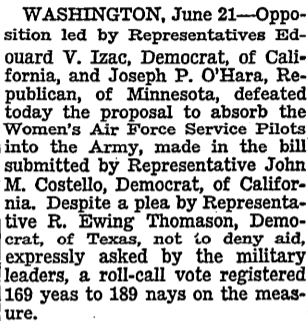
House Defeats Bill To Put WASPS In Army, The New York Times, June 22, 1944.
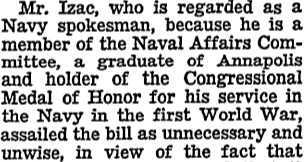
House Defeats Bill To Put WASPS In Army, The New York Times, June 22, 1944.
"The proposal to extend the WASPS has not been justified. Therefore it is recommending that the recruiting of inexperienced personnel and their training for the WASPS be immediately terminated. That the use of the WASPS already trained and in training be continued and provision be made for hospitalization and insurance. There exist several surpluses of experienced pilot personnel available for utilization as service pilots; therefore, it is recommended that the service of these several groups of experienced air personnel be immediately utilized." - Congressional Record from the House of Representatives, June 21, 1944.
"The families of the WASPs who died received no benefits, no flag, and no gold star to hang in their windows. The government made no provision for returning the bodies back home because the women had no official military status. The WASP themselves would contribute money, when necessary, to send a body home for burial." - Fly Girls, Public Broadcasting System, May 24, 1999
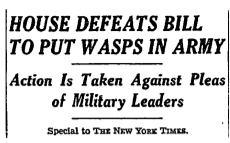
"House Defeats Bill To Put WASPS In Army," The New York Times, June 22, 1944.
"Personally, I am satisfied that the women have served the country well, but that was during the war. I feel now that the war is over - and I hope there is no danger of another war - that it will not be necessary to expand the women's branches of the armed services." - Representative Adolph Sabath of Illinois, Congressional Record, April 21, 1948
After these events occurred, the WASP was disbanded.
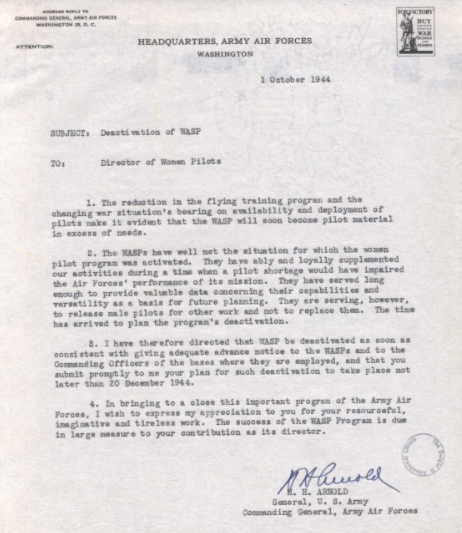
General Arnold, letter to WASPs about dismembering of the program, October 1, 1944.
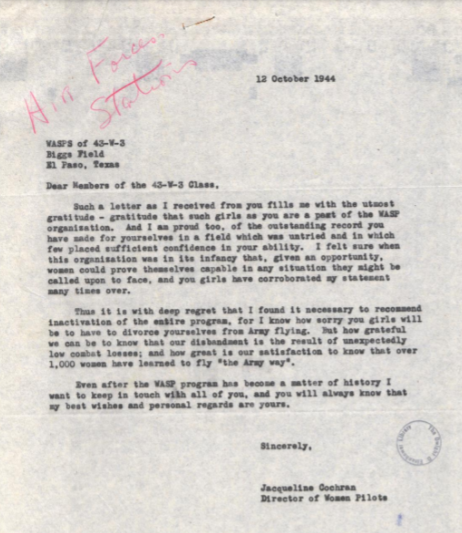
Jacqueline Cochran, letter to WASPs discussing dismembering of program, October 12, 1944.
“The WASPs were the only women’s military branch established during World War II that did not receive congressional approval” - Clipped Wings: The Rise and Fall of the Women Airforce Service Pilots (Wasps) of World War II, by Molly Merryman.
Regardless of the backlash they encountered, the WASPs set an important precedent for future women aviators and fought for proper military recognition, despite being denied the first time it was proposed.